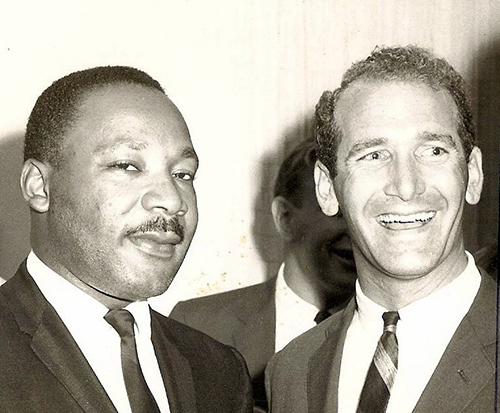Deborah Watts and Mark Ratliff of Newtown Quaker Meeting will lead a discussion on Martin Luther King’s Letter from a Birmingham Jail at 9:45 a.m., Sunday, January 120 at the Newtown Quaker Meetinghouse, 219 Court Street. Following the presentation, there will be worship in the manner of Friends at 11:00 a.m., with people speaking out of the silence as they are moved to do so.

Deborah Watts of Newtown is Performing Arts Department Chair and Music Director at the Hun School of Princeton, NJ, and Mark Ratliff of Pennington, NJ is Senior Infrastructure Architect, Office of Information Technology, Princeton University.
Martin Luther King and Quakers crossed paths quite often. The American Friends Service Committee (AFSC) sponsored his trip to India in 1959 to study the non-violence of the Gandhi organization. Bayard Rustin, one of the organizers of the March on Washington, was a Quaker – as was Joan Baez, one of the singers. Many Quakers marched with King and met with him. The astounding Letter from a Birmingham jail, written on scraps of paper and smuggled out by his lawyer, was first published by the AFSC (Quakers) which ran off 50,000 copies!
King had been arrested in Birmingham, Alabama April 16, 1963 for holding a parade without a permit.
King wrote “I am in Birmingham because injustice is here.” The Letter from Birmingham Jail defends the use of nonviolent resistance to racism. It says that people have a moral responsibility to break unjust laws and to take direct action rather than waiting potentially forever for justice to come through the courts.
Responding to being referred to as an “outsider,” King writes, “Human progress never rolls in on wheels of inevitability; it comes through the tireless efforts of men willing to be co- workers with God, and without this hard work, time itself becomes an ally of the forces of social stagnation.” He goes on to say,”Injustice anywhere is a threat to justice everywhere” and quotes Chief Justice of the Supreme Court, Earl Warren, in saying “Justice too long delayed is justice denied.”
On January 20, the discussion will explore the following questions: “When in your life have you been moved to “travel” to the site of injustice? “What sort of injustice would motivate you to act?” “How do people act on inward guidance of Spirit in response to injustice? “When is it appropriate to work patiently within the ‘system’, and when is it appropriate to take more direct action?”